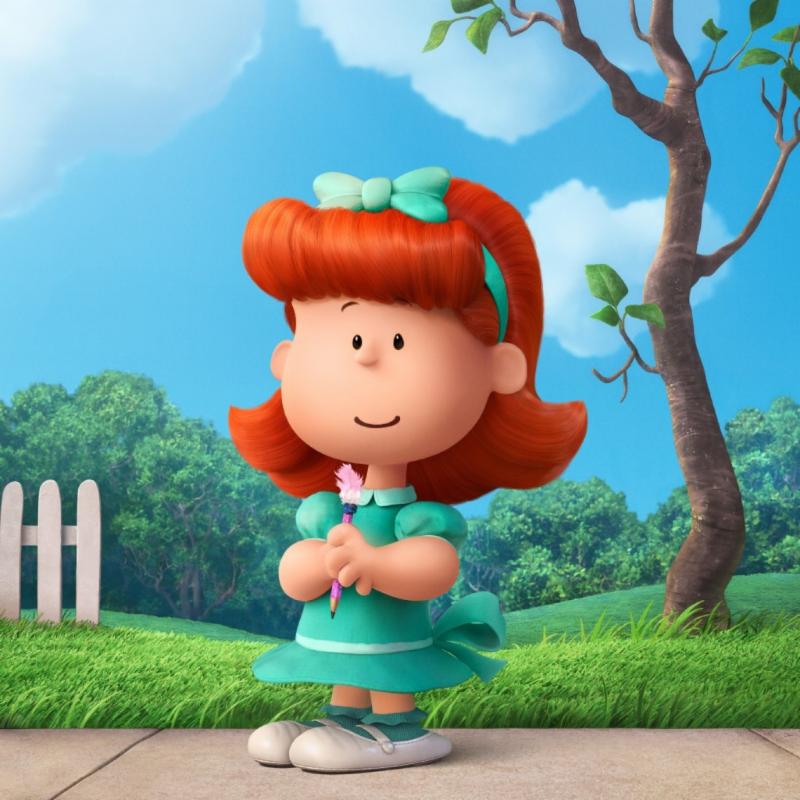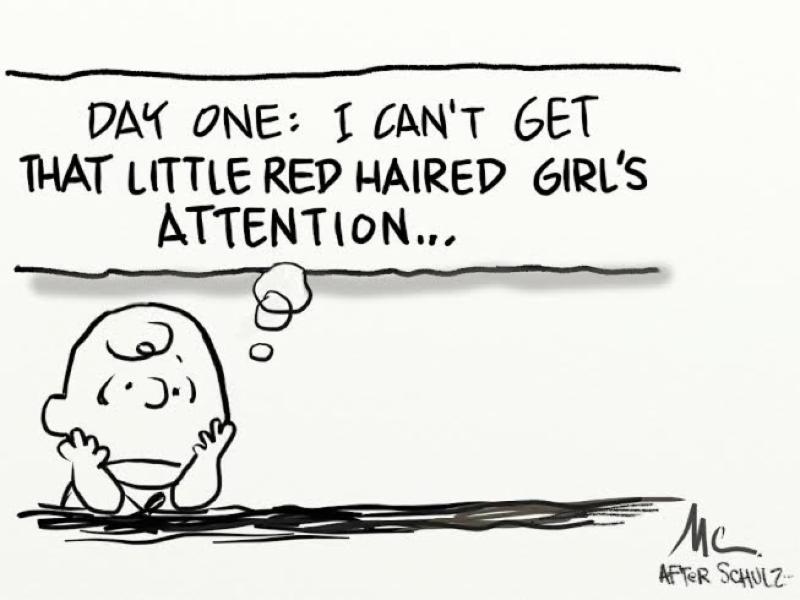This article was constructed with the help of either writings, lectures or shiurim of Rabbi’s Noach Isaac Oelbaum, Asher Hurzberg, Mr. Boaz Davidoff

BEN ADAM MA LECHA NIRDAM…….
AL CHET SHEH CHATANU LECHA B’TIMTUM LEV……
Everyone on the planet, at one point in his or her life, has had a crush, whether in grade school, high school or for that matter, even old school. When Cupid shoots his arrow, we’re sitting ducks and those arrows sting at any age and time. Unfortunately, this experience can be quite debilitating, as can any consuming obsession.
I was taken aback by an article I read, about the waste of precious time and energy which infatuation can cost a person and how this topic played a key role in one of my favorite childhood cartoons. Perhaps this is why so many found it easy to identify with the main character and his experiences.

Peanuts was a syndicated, American comic strip, written and illustrated by Charles M. Schulz, which ran from October 2, 1950, to February 13, 2000. It was also made into cartoon TV specials, which earned high ratings. This strip is the most popular and influential in the history of comic strips, with 17,897 strips published in all, making it “arguably the longest story ever told by one human being”.
The premise focuses entirely on a miniature society of young children, with no shown adult characters. The main character, Charlie Brown, is meek, nervous and lacking in self-confidence. He is unable to fly a kite, win a baseball game, or kick a football.
One of the ongoing themes, is Charlie Brown’s infatuation with Little Red-Haired girl. Interestingly, Charles Schultz was inspired in this, by his personal experiences in real life.
A former co-worker, Donna Mae Wold (born Donna Mae Johnson January 3, 1929 in Minneapolis, Minnesota, died August 8, 2016 in Richfield, Minnesota), was Schulz’s inspiration for the character. A 1947 high school graduate, Johnson was working in the accounting department of Art Instruction Inc., a correspondence school where Schulz also worked. Johnson and Schulz eventually became romantically involved and dated for three years, but in 1950 when Schulz proposed to her, she turned him down, saying she was already engaged. Schulz was devastated, but he and Donna remained friends for the rest of his life. Schulz said of the relationship, “I can think of no more emotionally damaging loss, than to be turned down by someone whom you love very much. A person who not only turns you down, but almost immediately will marry the victor. What a bitter blow that is. Last summer, day after day, I called the Little Red-Haired Girl. And night after night, I wondered whether I would ever actually get to talk with her.”
Last July, Michael Cavna of the Washington Post, finally spoke with Ms. Wold, who was warm, humble and endearing, as well as reassuring that she had built a fulfilling and rewarding life. More than six decades ago, she had chosen her longtime firefighter husband over Charles M. Schulz. Schulz, the world-famous Peanuts creator, turned his heartache into art, with his scarlet-haired character.
“Oh, we dated for about two years,” Ms. Wold told me of her relationship with “Sparky” Schulz after they met at a Minneapolis instructional art school; both he and Allan Wold proposed marriage. “I loved him. I guess I chose Al because I knew all Al’s friends, who became my friends. I didn’t really know Sparky’s friends.”
“But it was a long time ago,” added Wold, speaking by phone from the Minneapolis area, where she had lived her full life, traveling and camping and adventuring (she loved the Grand Tetons) and becoming a mother to four and a foster mother to scores more.
Allan and Donna Wold married in 1950, the same year that Peanuts debuted.Schulz would introduce his mysterious, Donna inspired character to Peanuts readers on Nov. 12, 1963, as Charlie Brown said dreamily, “I’d sure like to eat lunch with that little red-haired girl.”
“She’s the object of his affection,” Jean Schulz, Sparky’s widow, told me last year. “We can’t [really] know her. … There’s this mystique and this fantasy.”
Ms. Wold lived in the shadow of that silhouette for more than a quarter-century, acknowledging her role of inspiration in 1989, upon the release of the Schulz biography, Good Grief. “It got her out in the spotlight just a little, not too much,” Allan Wold told the Star Tribune of Minneapolis.
Donna Mae Johnson Wold died Aug. 9 of heart failure and complications from diabetes, the Star Tribune reported over the weekend. She was 87.She is survived by her husband; her daughters Sally Wold, Peggy Baumtrog and Susan Trulen; a sister, Margaret Olson; seven grandchildren; and 13 great-grandchildren.”I’ve had a good life,” Ms. Wold told me last summer. “A very happy life.”

We live in a world in which it’s inevitable that we’ll have disappoint-ments. It is interesting to observe how the lives of Schultz and Wold took different paths. Did Schultz ever get over his love interest? We can often ask the same questions of ourselves. If we were able to overcome our feelings, how much pain staking time did we waste obsessing over them? How many different life decisions have we made, as the result of the emotional scars we were left with? It is sad to see poor, old Charlie Brown, dreaming his childhood away on that girl. The sweaty palms and practicing pickup lines in front of a mirror, are all too familiar. Wake up Charlie Brown!!! We are all susceptible to plunge into those emotions, which can deter us from meeting someone else or prevent us from doing our work, advancing in our studies or building relationships. Of course, obsessions and their resulting negative effects, can arise over any area in life and are not limited to love interests.
The powerful, opening remark of our slichot, which we began reciting a month before Rosh Hashana, is BEN ADAM MAH LECHA NIRDAM- Son of Man why are you sleeping!! This phrase is designed to make us aware of our state of mind. The expression refers to a story from our Jewish history, where sailors approached the sleeping Yonah, when their ship was in dire straits. “We need your prayers; pray to your G-d, for we will all drown,” they said to him. This statement is a wakeup call to us, as well. We too, have to wake up, smell the coffee and repent. We have been sleeping and letting life slip away. It’s about time to look for G-d before it is too late.

This lesson applies to every aspect of life, for in order to serve G-d properly- the reason why we are here- we cannot let anything deter us from being the best we can be. We cannot let anything debilitate us from doing our precious work, which can be done exclusively by us. If we get caught up in obsessions, we lose out on precious time; we lose out on true happiness; we lose out on life.
We learn an incredible lesson from the Torah’s perspective of matchmaking. I believe these words of wisdom alone, can enhance our quality of life, immeasurably.
Rabbi Yossi Bilus attended a lecture by Rav Pam, on Chayeh Sarah. Rabbi Bilus remembers a powerful lesson from that lecture, that made a lasting imprint on his life.
Often times, people date hoping to find their partner in life. People frequently think they’ve graduated from “hoping to find,” to “it’s happening, I’ve found my match.” They already find themselves thinking about how many kids they are going to have and where they are going to live. And then a short time later, the other party walks away disinterested, leaving the partner devastated and doomed. There are those who never get over the hurt.

Avraham, our forefather instructed his trusted servant, Eliezer to find a wife for his son, Yitzchak. When Eliezer reached the well of the city where Avraham told him to go, he saw Rivka approaching. She did him tremendous kindness, giving him and his camels water. Eliezer was so sure he had found Yitzchak’s mate, that he showered her with jewelry. The mission seemed to be accomplished. But when Eliezer met Rivka’s family, he said something peculiar. “And now if you want to do kindness and are interested – tell me if not I will turn to the right or left”. In other words, if you’re interested, great, if not I will look elsewhere. Even after giving Rivka all of that jewelry, Eliezer was prepared to break off the process. We learn from here, that If it’s not working out, it’s not what G-d wants and no matter how perfect it seemed, we have to move on!!
My mother would always say to me when I was dating, “every pot has a cover”. Those were reassuring words. However, in order to feel that reassurance, we have to be at peace with ourselves. We have to have the right frame of mind, to make the great, big step. We also have to let go of the ghosts in our heads, of what it would have been like if the other party would have stayed. That was the past; we must look forward.
This is why we recite AL CHET SHEH CHATANU LECHA B’TIMTUM LEV-On the sins that we are committed through confusion of the heart.
Since when are we chastised for being confused? Isn’t that a little harsh? Many of us are confused. For goodness sake, we live in New York city!! with neon lights flashing all around us. Do we have to be chastised for that?
Rabbi Oelbaum says the answer lies in the Ten Commandment. The two tablets are shaped almost like a heart.
When we received the first tablets, the words were engraved in them symbolizing that everything found in the Ten Commandments is etched in each of our hearts. Our emotions are vital to our survival. The heart is pivotal in directing ourselves in the right direction. Therefore, it has to have clarity to the highest degree. It is for this reason the Torah was infused directly into our hearts.
However, after the sin of the golden calf, the passive, automatic connection to G-d was no longer. The heart entered a confused state as a result of our blunder. We had to start being more aggressive. We had to work to incorporate the Ten Commandments into our hearts ourselves, in order to see clearly and eradicate the confusion. In order to move forward, the Torah gives us guidance, so we shouldn’t fall off track into obsessing and time wasting.
When we don’t take that step of incorporating the Ten Commandment into our lives, our hearts remain confused and we are responsible for not taking the initiative.
For this reason, Eliezer, Avraham trusted servant was prepared to break away so easily. He ruled over his emotions and didn’t allow them to rule over him.
Good grief, Charlie Brown wake up!! Wake up and smell the coffee!! Good grief, we should wake up in time…. Be’ezrat Hashem.



 Considering the importance a shiduch might mean to one’s life, its human nature that one would do anything to get a mate that they think is most suitable. Competition is fierce. Some might resort to enhance themselves in a very exaggerate way. One can argue “what’s a little white lie?” It’s for constructive purposes…..Well, is it allowed?
Considering the importance a shiduch might mean to one’s life, its human nature that one would do anything to get a mate that they think is most suitable. Competition is fierce. Some might resort to enhance themselves in a very exaggerate way. One can argue “what’s a little white lie?” It’s for constructive purposes…..Well, is it allowed?
 An individual who is asked for [or is aware of (34)] information about a shiduch must divulge what he knows regarding a “major deficiency”, as detailed above. One who deliberately withholds such information: transgresses the prohibition of “lifnei eiver lo sitein michshol” (35) -“placing an object to stumble before the blind man”.
An individual who is asked for [or is aware of (34)] information about a shiduch must divulge what he knows regarding a “major deficiency”, as detailed above. One who deliberately withholds such information: transgresses the prohibition of “lifnei eiver lo sitein michshol” (35) -“placing an object to stumble before the blind man”. What should parents be looking for in their investigation? Before beginning the search, it is important to decide which values are important to your family and what criteria should be used in evaluating a potential shiduch.
What should parents be looking for in their investigation? Before beginning the search, it is important to decide which values are important to your family and what criteria should be used in evaluating a potential shiduch. here was a moment of silence where then Moshe burst laughing. Now he rises and tells the guests and his new father-in-law “the horn of the car was dead. The reason I was in B’nai B’rak that day was to have it fixed. However, the Mechanic was not available and that’s when I met you”.
here was a moment of silence where then Moshe burst laughing. Now he rises and tells the guests and his new father-in-law “the horn of the car was dead. The reason I was in B’nai B’rak that day was to have it fixed. However, the Mechanic was not available and that’s when I met you”.
